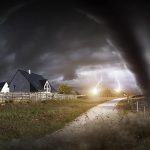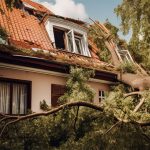Tornado Damage and Insurance: Here’s What You Need to Know
Tornadoes make their way all over the country, so regardless of where you live, you’ll want insurance to cover the damage. You’ll be covered no matter when a tornado might strike.
The question is, do you need a special policy for tornado damage, or is it covered under your homeowner’s insurance? Today’s blog answers that question and provides all the details you need to know. Keep reading to learn more.
Tornadoes in the United States
Roughly 1,200 tornadoes afflict the United States each year. While tornadoes aren’t as deadly as hurricanes or wildfires, they are capable of causing immense destruction, especially to a neighborhood.
Tornado season strikes the Southeast during the cooler months, heads to the Southern and Central Plains in the late spring, then to the Northern Plains and Midwest in the early summer.
Tornado Insurance
While tornadoes are natural disasters, they don’t require a special insurance policy like floods or hurricanes because they are considered a type of wind storm. Most homeowners’ insurance policies cover the wind damage that causes branches to fall and damage your roof. It’s that same wind — on a more extreme level — that causes tornadoes.
3 Main Coverage Types
Homeowners’ insurance is divided into three coverages: dwelling, personal property, and additional living expenses.
- Dwelling coverage is for your house as a physical structure. If a tornado hits your home, damaging it or destroying it, dwelling coverage will pay for the repairs. Dwelling coverage includes your garage or deck, so long as they are attached to your home.
The coverage titled “other structures coverage” would cover any detached structures, such as a detached garage or a shed.
Regarding the cost of repairs, your insurance will cover how much it costs to rebuild your home. This value is not the same as your home’s real estate market value.
Getting extended or guaranteed replacement cost coverage is a good idea since it allows you to get upgrades for your house that your dwelling coverage might not pay for. It also covers any costs that go above your coverage limits.
- Personal property coverage is for your personal belongings, including furniture, clothes, electronics, kitchen appliances, jewelry, toys, rugs, artwork, etc.
Personal property coverage covers a percentage of the dwelling coverage. If your dwelling coverage is $300,000, your personal property coverage is set at 70%, which is $210,000.
However, if you know your possessions are worth more than that 70%, you can purchase more coverage. We recommend creating a home inventory to determine your possessions’ worth, so you’ll know how much coverage you need to purchase.
- Additional living expenses cover non-structural issues. For example, your home might be too damaged for you to live in while it’s being repaired. Additional living expenses would cover the cost of lodging, meals, and other services like pet boarding fees or laundry services.
Like personal property coverage, additional living expenses are usually a percentage of your dwelling coverage, but you can always buy more if needed.
Your Wind Deductible
When checking your homeowner’s policy, you’ll want to pay attention to your wind deductible since tornadoes are classified as a type of window damage. Not every state has a wind deductible, but if your state does, it will be separate from your regular home insurance deductible.
Your wind deductible will range from 1 to 5% of your dwelling coverage. Say your home has that $300,000 dwelling coverage; you’d pay a $15,000 deductible before your insurance coverage pays for any repairs.
Renter’s Insurance
Renter’s insurance works very similarly to homeowners insurance; only it doesn’t cover damage to the building where you live. That’s because the landlord’s insurance will cover that damage. Instead, renter’s insurance covers your personal property and additional living expenses, which is all you would need to worry about as a renter.
Car Insurance
After your home, you’re probably most concerned about your vehicles. While homeowners insurance won’t cover your vehicle, your car insurance will if you have comprehensive car insurance.
Comprehensive coverage isn’t required by law unless your vehicle is on a lease and the leasing company requires it. But it’s a great idea to purchase it if you’re worried about a tornado damaging your vehicle. Additionally, you can buy rental reimbursement insurance so that you have a vehicle to drive while your car is being repaired.
Filing an Insurance Claim
There’s a process for filing an insurance claim under your homeowner’s insurance policy. Following this process will ensure that everything goes as smoothly as possible.
- Once local authorities have declared your home as “safe to enter,” you’ll inspect your home for structural damage issues, taking photos for evidence as you go.
- During your inspection and at all times, avoid downed power lines.
- Stay away from debris, broken glass, and exposed nails. We recommend wearing sturdy shoes or boots, long sleeves, and gloves for your protection.
- Turn off the electricity, natural gas, and propane tanks if you can do so safely.
- Examine what items need to be replaced under your personal possessions coverage.
- Wait for your insurance adjuster to come before you make any repairs or throw anything out.
- Keep receipts for all repairs and lodging expenses if you can’t live in your home until it’s been repaired.
Call Hudson Douglas Public Adjusters
Navigating your insurance policy can be difficult, especially if you’re working with a difficult insurance adjuster who is only interested in making a deal favorable to the insurance company.
That’s where we come in. Hudson Douglas Public Adjusters is here for you and you alone. Instead of negotiating to find a fair deal for you and your insurance company, we negotiate solely on your behalf to ensure you get the coverage you’re owed.
With more than 50 years of experience, we have the skills you need. Let us represent you. We work with customers in Arizona, Utah, Nevada, Colorado, New Mexico, Pennsylvania, and New Jersey. Call us at 800.898.4290, or fill out the form on our website to get started.




